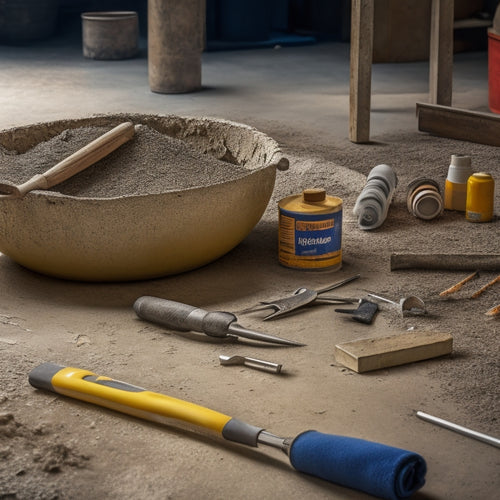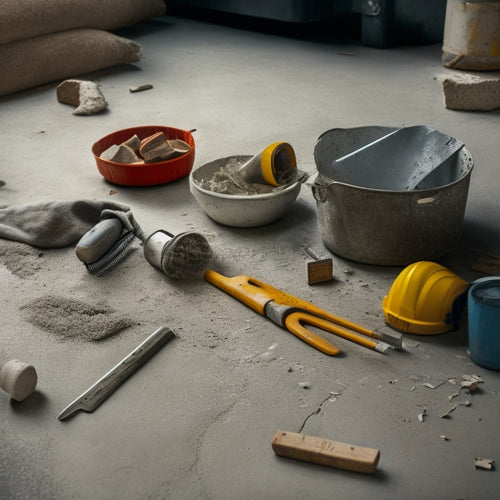
Top Tools for Cleaning Concrete Block Surfaces
Share
When cleaning concrete block surfaces, you'll need the right tools to get the job done efficiently. Start with a pressure washer, choosing between electric, gas, or diesel-powered models depending on the size of your area and task. Next, select a bristle brush that suits your surface type, considering factors like bristle length, material, and durability. Don't forget to pair your brush with the right chemical solutions for tackling stains and dirt buildup. For tougher tasks, consider adding rotary tool accessories, wire brushes, and safety gear like protective eyewear and gloves to your arsenal. Now that you've got the basics covered, plunge deeper to uncover the best tools and techniques for your specific cleaning needs.
Key Takeaways
- Pressure washers, especially electric and gas models, are effective for cleaning concrete block surfaces, especially for larger areas.
- Brushes with varying bristle lengths and materials can tackle different surface types, from rough to smooth, and heavy buildup to maintenance cleaning.
- Ergonomic handles with comfort and control features, such as secure grip and contoured shape, enhance cleaning efficiency and reduce user fatigue.
- Chemical solutions like acidic cleaners, eco-friendly solutions, and degreasing agents can target specific stains and surface issues, but require safety precautions.
- Rotary tool accessories, including diamond-coated, carbide-tipped, and wire brushes, can remove mortar, old paint, and stubborn dirt for surface preparation and cleaning.
Pressure Washer Essentials
With a concrete block surface to clean, you're likely to need a reliable pressure washer to get the job done efficiently. There are several pressure washer types to choose from, including electric, gas, and diesel-powered models. Each type has its own advantages and disadvantages, so it's crucial to select the one that best suits your needs.
Electric pressure washers are ideal for small to medium-sized areas, while gas and diesel-powered models are better suited for larger areas and heavy-duty cleaning.
In addition to the pressure washer itself, you'll need the right accessories to get the job done. Pressure washer accessories, such as nozzles, wands, and hoses, can make a significant difference in the effectiveness of your cleaning process.
Nozzles, for instance, come in various angles and sizes, allowing you to adjust the spray pattern to suit your specific cleaning needs. Wands and hoses, on the other hand, provide additional reach and flexibility, making it easier to clean hard-to-reach areas.
Bristle Brush Selection Guide
When selecting a bristle brush for cleaning concrete block surfaces, you'll want to take into account the type of material, as nylon, polyester, and natural fibers each have their own strengths and weaknesses.
The length of the bristles is also essential, as it affects the brush's ability to reach into crevices and corners.
Additionally, think about the handle's ergonomics, as a comfortable grip can make all the difference in your cleaning efficiency and endurance.
Brush Material Options
Choosing the right bristle brush for cleaning concrete block surfaces is vital, as it directly impacts the effectiveness of the cleaning process.
You'll need to decide between natural fiber brushes, which are eco-friendly and gentle on surfaces, and synthetic brush options, which offer increased durability and resistance to harsh chemicals.
When selecting a brush, consider the surface type, cleaning solution, and level of dirt buildup. Natural fiber brushes, like those made from coconut or sisal, are suitable for lighter cleaning tasks, while synthetic brushes are better suited for heavy-duty cleaning.
Regardless of your choice, proper brush care techniques and maintenance tips are significant for extending the brush's lifespan. Regularly cleaning and storing your brush in a dry place will prevent damage and guarantee peak performance.
Additionally, consider brush durability factors, such as the quality of the bristles and the construction of the brush head. A high-quality brush may cost more upfront, but it will ultimately save you time and money in the long run.
Bristle Length Matters
Three key factors influence the effectiveness of a bristle brush on concrete block surfaces: bristle material, brush head construction, and bristle length.
When it comes to bristle length, you'll want to take into account the type of surface you're cleaning and the level of dirt or grime you're dealing with. Longer bristles (typically 1-2 inches) are better suited for rougher surfaces or heavy buildup, as they can reach deeper into crevices and provide more aggressive cleaning. However, they may be too harsh for smoother surfaces, causing damage or scratching.
Shorter bristles (usually 0.5-1 inch) are ideal for smoother surfaces or maintenance cleaning, as they're gentler and more precise. They're also more effective at picking up fine dust and debris.
Bristle length also affects bristle stiffness and durability. Longer bristles tend to be stiffer, which can be beneficial for heavy-duty cleaning, but may lead to breakage. Shorter bristles are generally more flexible and durable.
Handle Ergonomics Importance
As you grip the handle of your bristle brush, the comfort and control it provides can make all the difference in effectively cleaning your concrete block surface. A well-designed handle can reduce fatigue and improve your overall cleaning experience.
Look for a handle with ergonomic design that fits comfortably in your hand, allowing you to maintain a secure grip even when applying pressure or working at awkward angles.
A handle with proper ergonomic design will have a contoured shape that complements the natural curves of your hand, reducing strain on your wrist and fingers. This is particularly important when cleaning large concrete block surfaces, where you may be holding the brush for extended periods.
A comfortable handle also enables you to apply the right amount of pressure, guaranteeing a thorough clean without straining your hand or wrist.
When selecting a bristle brush, prioritize handle comfort and ergonomic design to guarantee a comfortable and effective cleaning experience.
Chemical Solutions for Stains
Tough stains on concrete block surfaces often require more than just elbow grease to remove.
You'll need to bring in the big guns – chemical solutions specifically designed to tackle stubborn stains.
When it comes to stain removal, you have several options:
-
Acidic cleaners: Effective at breaking down mineral deposits and rust stains, but be cautious when using them as they can etch the concrete surface.
-
Eco-friendly solutions: Environmentally friendly alternatives to harsh chemicals, perfect for those who prioritize sustainability.
-
Degreasing agents: Ideal for removing oil and grease stains, these solutions can also help with surface preparation for protective coatings.
- Mold removal products: Formulated to target mold and mildew, these solutions are essential for maintaining a clean and healthy concrete block surface.
Remember to always follow the manufacturer's instructions and take necessary safety precautions when working with chemical solutions.
Proper use will guarantee effective stain removal and surface preparation for your concrete block surface.
Scrub Brush Tool Options
You'll need a scrub brush that's up to the task of tackling tough concrete block surfaces, and that starts with choosing the right bristle type.
The size of your brush also matters, as it'll affect the area you can cover and the level of detail you can achieve.
When selecting a scrub brush, consider the handle material as well, as it'll impact the tool's overall durability and comfort during use.
Bristle Type Matters
Your scrub brush is only as effective as its bristles, which is why selecting the right type is essential for tackling concrete block surfaces. The wrong bristles can scratch or damage the surface, while the right ones will effectively remove dirt and grime without causing harm.
When choosing a scrub brush for concrete block surfaces, consider the following factors:
-
Bristle durability: Look for bristles that can withstand the rough texture of concrete blocks without breaking or wearing down quickly.
-
Bristle flexibility: Flexible bristles are better at conforming to the irregular surface of concrete blocks, allowing for more effective cleaning.
-
Bristle material: Nylon or polypropylene bristles are good options for cleaning concrete blocks, as they're resistant to abrasion and can withstand harsh cleaning chemicals.
- Bristle stiffness: Stiffer bristles are better for removing heavy dirt and grime, while softer bristles are better for maintenance cleaning and removing light dirt.
Brush Size Importance
Pick a scrub brush that's the right fit for the job, and you'll be tackling those concrete block surfaces like a pro. The brush size you choose can greatly impact the effectiveness of your cleaning technique. A brush that's too small may not cover enough surface area, while one that's too large can be difficult to maneuver in tight spaces.
| Brush Width | Ideal Use |
|---|---|
| 4-6 inches | Small to medium-sized areas, such as individual blocks or tight spaces |
| 8-10 inches | Medium-sized areas, such as walkways or small walls |
| 12-14 inches | Large areas, such as building facades or parking garages |
| 16-18 inches | Extra-large areas, such as highways or large parking lots |
| 20 inches+ | Specialized use, such as cleaning machinery or equipment |
When selecting a brush, consider the size of the area you need to clean and the type of cleaning technique you'll be using. A wider brush will cover more surface area, but may require more elbow grease to maneuver. A narrower brush will be more precise, but may take longer to clean larger areas. By choosing the right brush size, you'll be able to tackle your concrete block surface cleaning tasks with ease and efficiency.
Handle Material Options
The scrub brush's handle material plays an essential role in its overall performance and durability. When choosing a scrub brush, you'll want to take into account the handle material's impact on your cleaning experience. A durable handle material guarantees the brush withstands regular use and harsh cleaning conditions.
Here are four common handle material options to take into account:
-
Fiberglass: Lightweight and resistant to corrosion, fiberglass handles are ideal for cleaning concrete block surfaces. They're also less prone to splintering, making them a safe choice.
-
Wood: Wooden handles are a popular choice for scrub brushes, offering a comfortable grip and good durability. However, they may require more maintenance than other materials and can be prone to splintering.
-
Plastic: Plastic handles are often inexpensive and easy to clean, but they may not be as durable as other materials. They can also become brittle over time, making them more prone to cracking.
- Steel: Steel handles are extremely durable and resistant to corrosion, making them suitable for heavy-duty cleaning tasks. However, they can be heavier and more expensive than other options.
When selecting a handle material, take into account factors like handle material durability, handle material compatibility with your cleaning solution, and personal comfort.
Rotary Tool Accessories
With rotary tools in your arsenal, it's time to investigate the array of accessories designed to tackle specific concrete block surface cleaning tasks. You'll find that different rotary tool types require unique accessories to achieve ideal results. For instance, a diamond-coated bit is perfect for removing mortar and grout, while a carbide-tipped bit excels at removing old paint and varnish.
| Accessory | Best For |
|---|---|
| Diamond-Coated Bit | Removing mortar and grout |
| Carbide-Tipped Bit | Removing old paint and varnish |
| Wire Brush | Aggressive surface cleaning |
| Sanding Drum | Smoothing rough surfaces |
Proper rotary tool maintenance is essential to extending the lifespan of your accessories. Regularly clean your bits and brushes to prevent clogging and wear. Store them in a dry place to prevent rust. By pairing the right accessory with your rotary tool and maintaining it properly, you'll be able to tackle even the toughest concrete block surface cleaning tasks with ease.
Wire Brush Cleaning Tips
Aggressive surface cleaning calls for a wire brush, which effectively dislodges stubborn dirt and grime from concrete block surfaces.
You'll find that wire brush techniques are essential for surface preparation, especially when dealing with rough or porous concrete blocks.
When using a wire brush for cleaning, remember to:
-
Choose the right wire brush: Select a brush with stiff bristles that can effectively remove dirt and grime without damaging the concrete surface.
-
Work in small sections: Divide the surface into smaller areas to maintain even cleaning and prevent re-depositing dirt onto cleaned areas.
-
Use gentle to moderate pressure: Apply enough pressure to remove dirt, but avoid applying too much pressure, which can scratch the surface.
- Rinse thoroughly: Use a hose or pressure washer to remove any remaining dirt and debris from the wire brush and concrete surface.
Safety Gear Must-Haves
You've got the right cleaning techniques down, but don't forget to prioritize your safety while tackling that concrete block surface. When working with concrete, safety gear is vital to prevent injuries and protect yourself from harsh chemicals and debris.
First and foremost, invest in protective eyewear that can shield your eyes from flying particles and chemical splashes. Look for goggles or safety glasses with a good seal and anti-fog coating to guarantee clear vision.
Next, don durable gloves that can withstand the rough texture of concrete and harsh cleaning agents. Choose gloves with grip and traction to prevent slipping, and opt for ones with a waterproof coating to keep your hands dry.
Frequently Asked Questions
Can I Use Bleach to Clean Concrete Block Surfaces?
You're wondering if bleach is a good cleaning solution for concrete block surfaces. While it might seem effective, you should exercise caution; bleach can damage the surface or discolor it, so take safety precautions and consider alternative cleaning solutions instead.
How Often Should I Clean My Concrete Block Surfaces?
You should clean your concrete block surfaces regularly, depending on usage and exposure. Aim for a cleaning frequency of every 1-3 months, and follow maintenance tips like sweeping before washing to prevent dirt buildup and damage.
What Is the Best Way to Remove Oil Stains From Concrete?
You'll effectively remove oil stains by acting quickly, blotting the spill, and applying a solution of baking soda and water, then rinsing and repeating if needed, using gentle concrete cleaning methods for oil stain removal.
Can I Use a Regular Household Broom to Sweep Concrete?
You can't use just any broom to sweep concrete; opt for a sturdy, outdoor-specific broom with stiff bristles or a push broom with nylon bristles, and employ gentle, overlapping sweeping techniques to avoid scratching the surface.
Do I Need to Seal My Concrete Block Surfaces After Cleaning?
As you stand victorious over your newly cleaned concrete block surface, you're like a conqueror claiming a treasure - but the real prize is yet to come. You'll want to seal it to protect your treasure from future stains and damage, and reap sealing benefits like enhanced durability and easier maintenance.
Conclusion
You've got the right tools and techniques to tackle even the toughest concrete block surfaces. Now, go forth and conquer the grime, just like a skilled chef seasoning a dish - adding the perfect blend of pressure, scrubbing, and chemical solutions to serve up a sparkling clean finish. Remember, safety gear is the secret ingredient that keeps you protected throughout the process. With these top tools and tips, you'll be the expert of concrete block cleaning in no time!
Related Posts
-

Top Tools for Repairing Cracked Concrete Surfaces
When tackling a cracked concrete surface repair, you'll need the right tools to guarantee a durable fix. Start with e...
-

Top 10 Concrete Repair Tools for Small Fixes
You'll need the right tools to tackle small concrete repairs efficiently and effectively. When it comes to small fixe...
-

Free Design Tools for Concrete House Planning
You can kick-start your concrete house planning project without breaking the bank, as there are several free design t...


